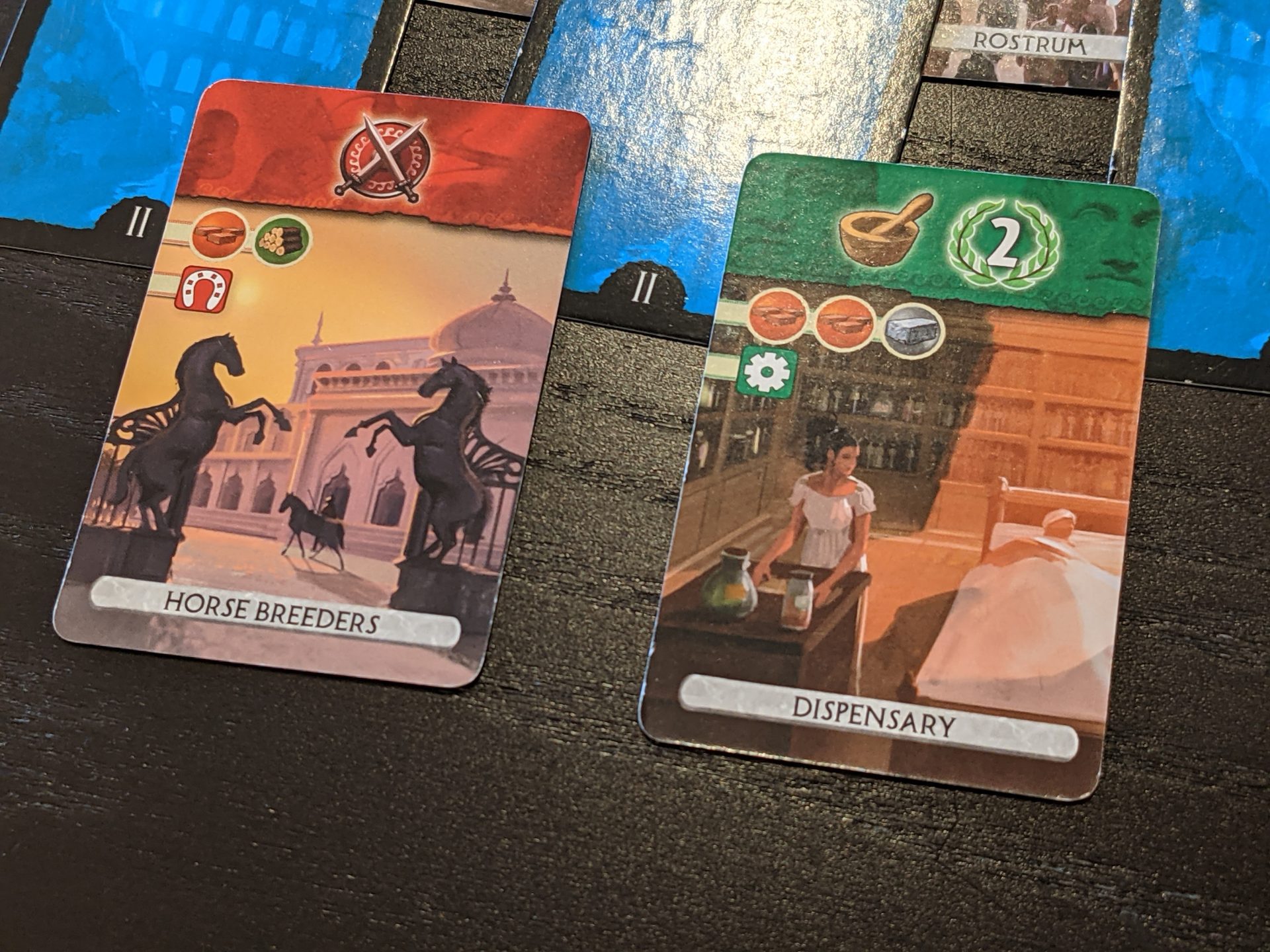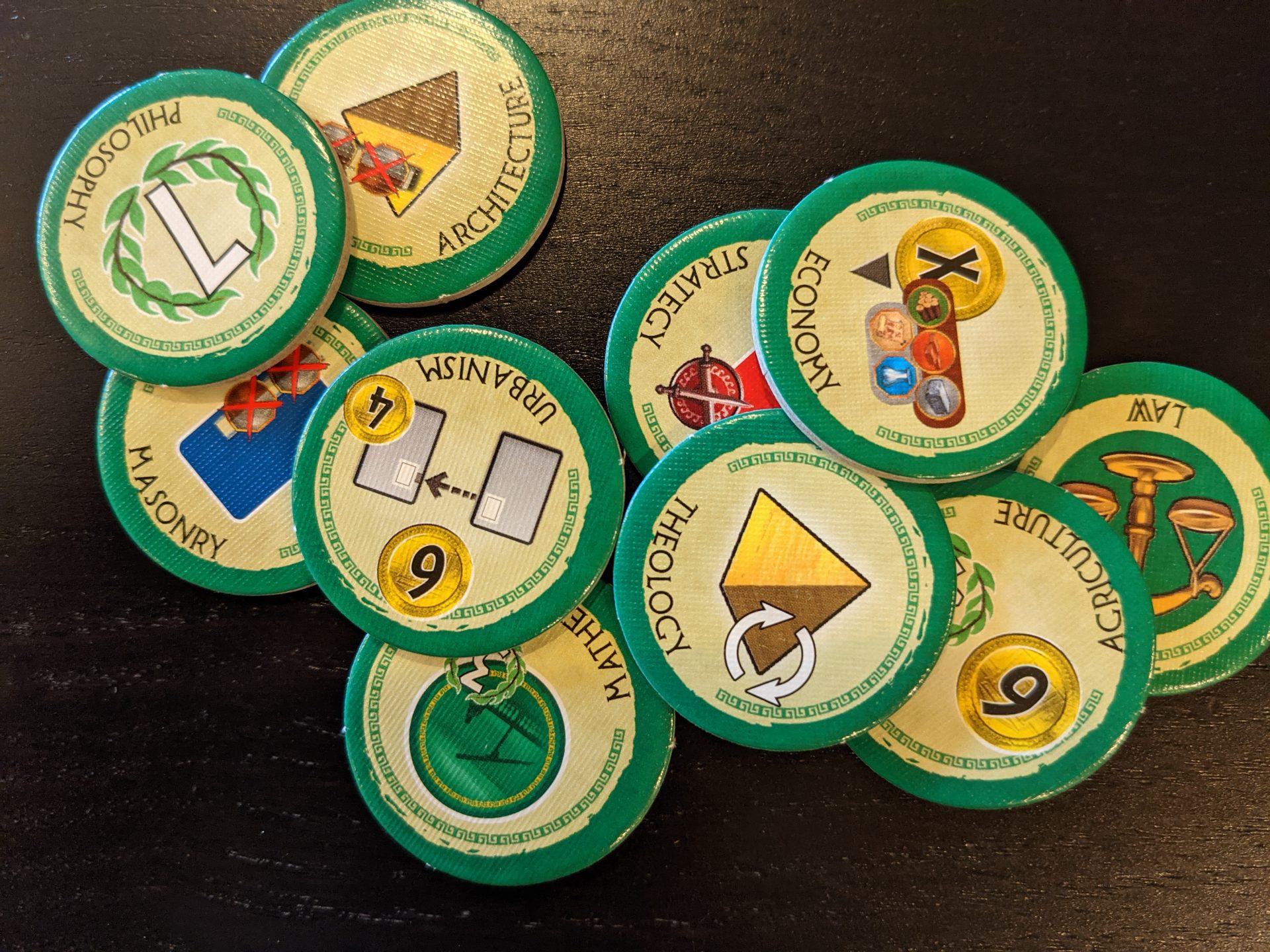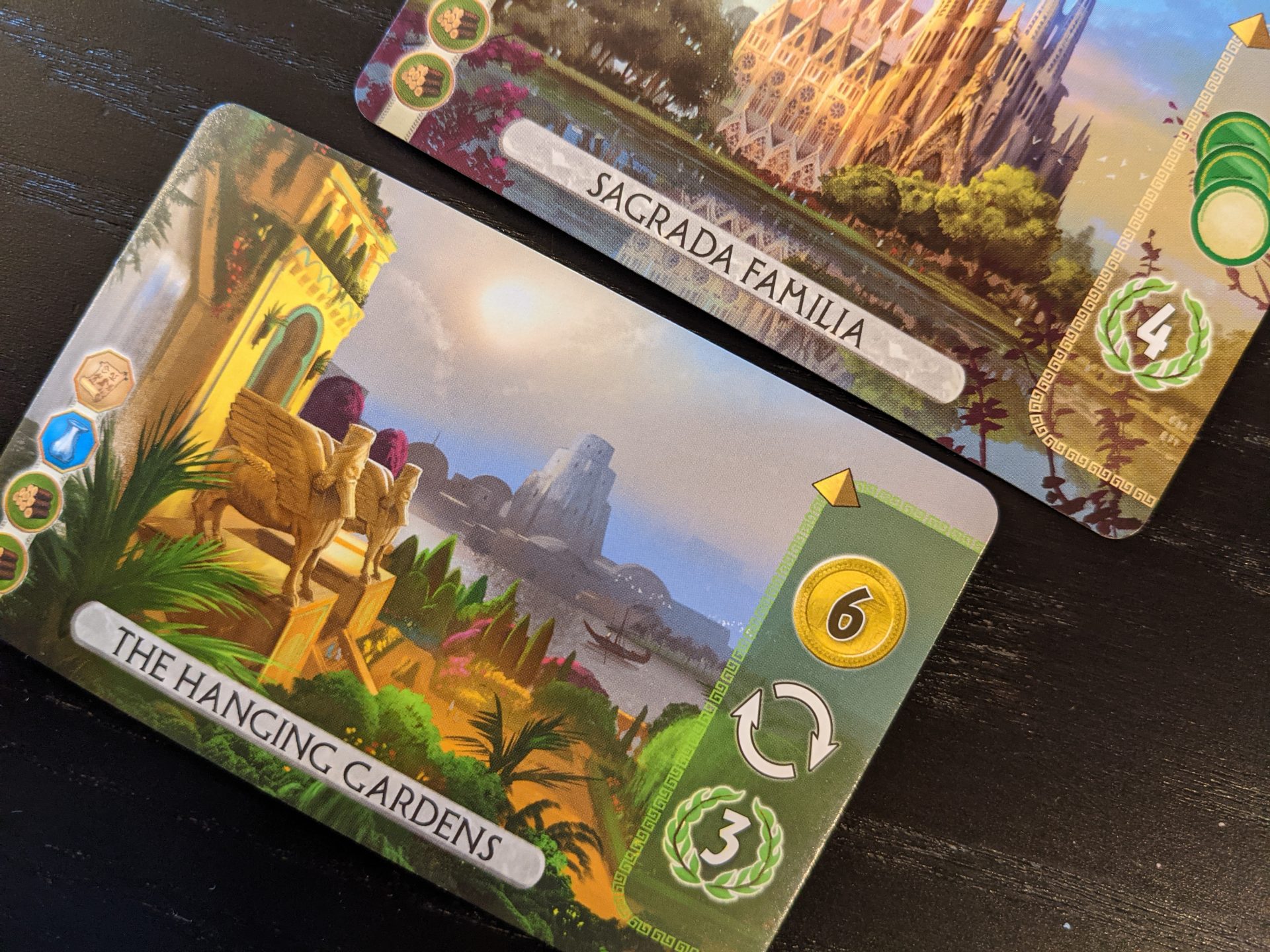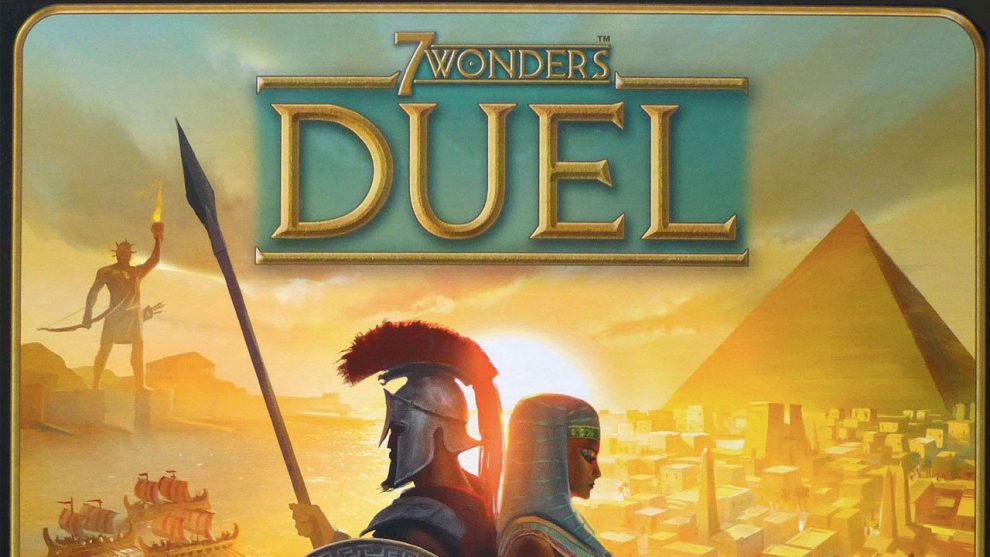As a veteran of the fantastic 7 Wonders (you can enjoy Kurt’s in-depth review here), I had a certain feeling the first time I tried the two-player variant described in the rulebook:
This is garbage.
So let’s give credit to the designer of the original 7 Wonders, Antoine Bauza, for recognizing what many of us now know to be the truth. But what if he went back to the drawing board and rebuilt the core 7 Wonders experience around two players going head-to-head?
Bauza, along with Bruno Cathala—the designer of the excellent and award-winning games Five Tribes and Kingdomino—came up with 7 Wonders Duel. And as they say, the rest is history.
My wife and I love 7 Wonders Duel so much that I sold my copy of the original 7 Wonders last year. Read on to find out why.

It’s 7 Wonders, With Smaller Cards!
7 Wonders Duel takes all the great card play of 7 Wonders but eliminates the take-one-card-and-pass-your-hand draft mechanic of the original game. (I will not be doing a full breakdown of the rules here; Kurt does a great job of describing the core mechanics and all the iconography of the 7 Wonders family in his piece.)
In each Age (essentially, a round) of 7 Wonders Duel, you will separate all the building cards by Age and build a “card board” of 20 cards, which positions 12 cards face-up, with the rest face-down for you to reveal as you select buildings from the card board. Depending on who was behind in a previous round (or randomly selected to start the game), one player starts the Age by simply taking one of the face-up cards from the card board, paying any costs similar to how cards were paid for in the 7 Wonders base game.
From there, players alternate turns until all cards in the display are “built” into your tableau, a tableau that will look eerily similar to the ones you build in 7 Wonders but with smaller cards (44 x 68mm, versus a standard poker card size). After three rounds, the game ends and you’ll total points to see who has created the best civilization.
7 Wonders Duel changes some of the end-game conditions by allowing for two other scenarios to force an immediate end to the game. The military rivalry board is tracked with a Conflict Pawn which begins the game equidistant from either player’s capital. Each time a player plays a military building into their tableau, this pawn moves one space closer to your opponent’s side of the board. If it ever reaches one player’s capital, that player loses immediately via the “Military Supremacy” condition.
7 Wonders Duel also introduces Progress Tokens, which track some of your scientific achievements like the green buildings did in 7 Wonders. These tokens can be earned any time you get a pair of matching science symbols on your green buildings (the same symbols from the original game), and the tokens give you either a very generous one-time or an ongoing benefit once earned. Also, if either player builds six of the seven available science symbols into their city, they automatically win the game through the “Scientific Supremacy” condition.
One other change comes in the form of Wonders. In the original 7 Wonders, players’ civilizations were represented as player boards, and each board had three or four Wonders that could be built by spending resources and burning a card to slip under their player board, representing the stages of their built Wonders.
In 7 Wonders Duel, players get to draft four Wonders (cards) for their individual city at the start of the game. Over the course of play, only 7 total Wonders can be built from the 8 available to the combined players…which makes building Wonders a race to see who can build all 4 before their opponent. Each built Wonder also triggers ongoing, one-time and game-end bonuses for the owner, so there’s a lot of incentive to win this race!
Most of the core gameplay of 7 Wonders Duel otherwise mirrors the strong play of 7 Wonders. So, why do these differences make me want to only play 7 Wonders Duel?

Another Close Finish!
There are so many reasons why I prefer 7 Wonders Duel over the original game. It’s amazing how much having children has changed my perspective on games, or maybe, the time it takes to play games. I love playing games just as much as I did 30 years ago when I was still playing Fortress America and Shogun in the basement of my buddy Chi’s place in Montgomery County, Maryland growing up.
But 30 years ago, I could sit at a table, or in a basement, or at a rec center for the entire day. No responsibilities after school was over on the weekend. Now? Sometimes on a busy work day and after getting kids through the dinner/bath/bedtime routine, I only have the strength left to absorb a 20-minute gaming experience.
Enter 7 Wonders Duel.
I don’t know if any of the 7 Wonders Duel games I’ve played with my wife have taken a full 30 minutes, even the first time we played it (although we both know the original game very well, which is a big win if you are trying to pick up the iconography of these products). The way the card board is laid out, the decision space is quite narrow: sometimes, you’ll only have a couple of cards to choose from, and if you are limited on the resources available to buy a card, that makes the decision even easier.
But then you are thinking: “If I take that card, it will flip that other card which could get me that three-shield military card, which I could use to get one space away from her capital. Or maybe I get that other blue card because it’s free for me, and I REALLY want to block her from getting it! Or MAYBE…”
And the list goes on. The way the card board changes from Age to Age is also fun, and even though the set of cards is somewhat limited in the base box I haven’t been tempted to add the expansions (Pantheon and Agora) because in our 20+ plays of 7 Wonders Duel, the game hasn’t gotten stale.
As tight as time can be for me right now, and as much as I love the mid-weight crunch of 7 Wonders Duel, I love it for one reason more than anything else: games are always close. Save for a single time when I lost a Military Supremacy decision (and I think that’s rare because you can always sense when your opponent can jump those last few spaces to your capital, easier than always keeping track of your opponent’s position with science symbols), games of 7 Wonders Duel are usually decided by just a few points.
I hate playing games where a person can win by a large percentage of points. Bauza and Cathala really tested this down to the brass tacks on the scoring. Every decision matters, but you always find that winning one or two races seals it—Wonders, maybe grabbing the Progress Tokens, maybe blocking another player from taking that blue card with an icon that allows that player to build it for free.
There must be something that I don’t love about 7 Wonders Duel though, right?

The Downside of Repeated Plays
The only weakness in 7 Wonders Duel? It’s a production thing for me. You basically have to sleeve the cards. I personally don’t believe in sleeving cards (a conversation for another day), so shuffling, reshuffling, placing, storing, flipping and maybe even looking at these cards funny have left them battered from repeated plays.
Smaller cards and weaker card stock: this combination has left me in an interesting place. I have on many occasions considered buying a second copy of 7 Wonders Duel just to trash my current one and have a fresh copy at my house. I’m waiting in the wings for a combo box that includes the base game and all of the expansions so that I can have a complete and mint copy to play when we break this out, usually 4-5 times a year.
But that is the brunt I bear personally, because I could have treated my copy better over the years. Another very minor quibble: the trading rules in 7 Wonders Duel are a little tricky to explain. Even now I refer to the rulebook during setup to remind myself of what you have to do to grab resources when you don’t produce them in your city, versus when your opponent does, and how much they cost based on their production level. It’s just a little dense. I don’t even have a suggestion on how to change them, because it works just fine. I just wish it was more straightforward.

The Perfect Two-Player Game
All of this gushing is for a good reason: I truly believe all gamers should own a copy of 7 Wonders Duel, but especially those who have a dedicated gaming partner at home. It’s easy to get to the table, takes only a play or two to get comfortable with the gameplay, and it always gives me lots of interesting choices to make in a breezy 20-to-30 minute playtime.
7 Wonders Duel never lets me down!












Add Comment